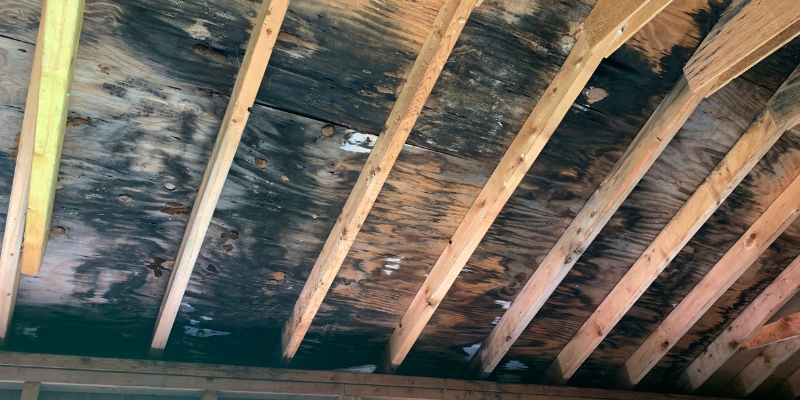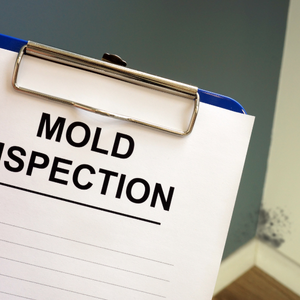
Blue Moon Acquisitions makes selling a house with mold in Michigan easier. We understand the challenges of mold issues and handle the process with transparency and efficiency. Learn how we help homeowners meet disclosure requirements, avoid costly repairs, and still get a fair cash offer, maximizing your property’s value without the stress.
Effective Strategies for Mold Inspection Before Listing Your Home
To avoid problems during a sale in Michigan’s real estate market, it is necessary to conduct a complete mold inspection before listing a house with mold in Michigan. The first step should be seeking the help of a certified mold inspector who has knowledge about the unique climate and building conventions of Michigan. These professionals concentrate on possible areas such as basements and attics, where, due to the presence of high humidity, mold usually occurs. They use sophisticated detection tools that enable them to locate hidden mould and evaluate indoor air quality, thus providing an extensive remediation report.
Being proactive about dealing with mould issues before selling a house with mold in Michigan ensures that there are no surprises when buyers have their inspections done; it also instills confidence in them. Obtaining a clearance certificate after professional remediation can act as an effective marketing tool, showing that the home is free from mold. This kind of documentation provides reassurance to prospective buyers regarding their safety while also protecting sellers from any legal claims that may arise thereafter. Therefore, having an effective approach towards mold inspection is one way through which you can increase your property’s attractiveness when selling houses with molds in Michigan, thereby maximizing its value within the competitive housing market found in this state.
DIY Mold Removal vs. Hiring Pros: What Michigan Sellers Need to Know
Nobody really anticipates a patch of mold while prepping a home for sale, yet Michigan humidity sometimes has other plans. Sellers quickly stumble onto a prickly choice: yank the stains themselves or call a crew with three-letter certifications. Mop-head-and-mask DIYers sing the praises of vinegar, baking soda, and quickened drafts. That hands-on tinkering can tidy a countertop but rarely hunts down the bloom behind drywall or under carpet, meaning the trouble may quietly return after the open house is over.
Certified abatement teams march in with moisture meters, sealed containers, and the confidence to chase spores wherever they hide. They wrestle with the dampness that invited growth in the first place, then issue a report that shows buyers the problem is finally legally cleared. Forking over a contractor invoice stings at tax time, yet often buys peace of mind, compliance with local codes, and a sharper edge when multiple offers come rattling in. How a seller answers the mold question can tilt an entire sale in Michigan, so weighing costs against long-term safety becomes not just practical but personal.
Budgeting for Mold Remediation: A Cost Guide for Michigan Home Sellers

Selling a house in Michigan’s damp climate can get complicated if mold decides to show up. Homeowners planning the sale really need to carve a chunk of the budget out for mold cleanup before any yard signs go up. Depending on how widespread the colonies are and whether they’ve chewed into drywall or beam, the tab can shift from a couple hundred bucks, say, for a quick wipe-down, to several thousand when replacement lumber or ductwork is on the list.
Shoppers who want a clear dollar figure usually start by gathering three or four estimates from local mold contractors. People in the business here know how lake humidity works and how state rules handle disposal, so the quotes tend to be apples-to-apples once the homeowner shows the techs where the problem really lies. Fixing the trouble up front not only clears the air literally but also lets prospective buyers tour the house without suspecting they’ll find surprise spores after closing. That kind of peace of mind can tip the scales in Michigan’s still-busy housing market.
How to Hire the Right Mold Inspector and Remediation Expert in Michigan
When you are selling a house in Michigan contaminated by mold, it is crucial to engage the right mold inspector and remediation expert to have a smooth and successful sale. First of all, starters should consider searching for professionals who hold certifications from reputable organizations like the National Association of Mold Remediators and Inspectors (NAMRI) or the Institute of Inspection, Cleaning and Restoration Certification (IICRC). These certificates guarantee that the inspector or specialist follows the industry standards and best practices, as well as Michigan’s specific requirements on disclosure of mold when selling real estate.
In Michigan, an experienced mold inspector can do a thorough inspection and give details about the level of mold contamination, which is essential for keeping transparency with potential buyers. Meanwhile, remediation experts must have personalized strategies for getting rid of mold safely and preventing future growth. Checking out previous clients’ referrals or reviews will help one avoid hiring an unqualified professional in the Michigan housing market. This way, you take care of your health issues while selling property with molds in Michigan; besides, it builds buyers’ trust, leading to an easier deal.
Legal Requirements for Disclosing Mold When Selling a House in Michigan
Disclosure is the key when dealing with mold in a house for sale in Michigan. According to Michigan law, sellers have to submit Seller’s Disclosure Statement disclosing all known defects of their property including mold and water damage. Mold disclosure must include past cases of molds and what was done by the seller to get rid of them. If this information is not given out then there are legal penalties that arise when buyers discover undisclosed mold problems later through lawsuits.
To be safe when selling a home with mold in Michigan, a proper inspection should be conducted by qualified personnel who will also provide documentation indicating any corrective measures taken. This measure guarantees compliance with the laws of Michigan, thus building trust among home buyers who are usually doubtful about purchasing houses contaminated with mold-related health hazards. Disclosing mold issues upfront facilitates an easier process during the transaction, thereby minimizing disputes within the real estate market, which is highly competitive in Michigan.
The Impact of Mold on Property Value and Home Sales in Michigan
Finding mold in a Michigan home can knock thousands off the asking price and turn a quick sale into a drawn-out headache. Buyers here often see mold not just as a stain on drywall but as a ticking clock for health troubles, allergies, and leaks that might creep up later. That kind of worry flips the switch from let’s make an offer to we need to walk, and the property sits idle while neighboring homes disappear from the market.
Mortgage lenders usually mirror that caution. A house tagged with visible mold can get tagged with a no-funding memo from underwriters, which yanks away an entire pool of would-be buyers.
Homeowners who tackle the problem head-on- hiring inspectors, clearing out the spores, fixing the source- tend to walk away with a price closer to their original hopes. A clean report signals buyers that they can move in, unpack, and start making memories rather than banishing-scanning every corner with a blacklight. In a state with four distinct sales seasons, that small show of proactivity can mean closing before the snow flies again, especially if you’re looking to sell your home for cash in Pontiac or nearby cities.
Preparing Your Home for Sale: Steps to Address Mold Issues Proactively

In Michigan’s fickle housing market, tackling visible or hidden mold before listing your home can be the difference between a quick sale and weeks of uncertainty. A thorough inspection is the first sensible step, and bringing in a licensed mold assessor often uncovers trouble spots the average eye would miss.
Once the trouble areas are marked, a certified remediation crew should handle the cleanup; they have the training to lock out any chance the spores sneak back. Smart home-owners also add extra ventilation: a sturdy dehumidifier in the crawl space and an upgraded exhaust fan in the bathroom both keep humidity in check.
Roof leaks, basement seepage, and any drippy faucets must be fixed as a separate insurance policy against fresh moisture. Fresh drywall or trim can brighten the rooms, and a coat of mold-resistant paint sends a clear message that the job is done. Honest sellers disclose the episode up-front, hand over repair invoices, and watch as skittish buyers, soothed by the paperwork, move confidently to the closing table.
How to Market a Mold-Free Home: Tips for Attracting Michigan Buyers
Selling a house that has dealt with mold is never easy, especially in the fast-moving Michigan market. The first, and often the only, step that really matters is to hire a licensed remediation crew and let them scrub every corner of the home. Once the work is signed off and the air is truly clear, brag about the certification in every flyer and online post. Buyers warm up fast when they see the phrase professionally treated.
Pictures carry most of the weight, so grab a wide-angle lens and catch the light pouring into mold-free rooms. Skip the low-res shots that try to hide old stains; honesty is cheaper than a new carpet. At showings, talk up fresh air and healthy breathing the way a coach hypes winning plays. Hand over invoices, before-and-after photos, and any warranty the contractor threw in, because a stack of paper can shout louder than a polished sales pitch. In a state where spring humidity invites trouble, that pile proves the house is no longer a gamble.
Top Buyer Concerns About Mold—and How Michigan Sellers Can Respond
Selling a house in Michigan that once sprouted a little mold can feel like an uphill climb. Most buyers ‘ first thought is how that dark patch might hitch a ride into their lungs. Nearly every corner of the state has its allergy season, so respiratory safety is no small matter. A well-thumbed report from a licensed mold inspector, plus a freshly dated receipt from the crew that cleaned it up, turns that fear from a brick wall into a speed bump.
Even when the air is clear, folks want to know whether the beams and studs are still packing their original muscle. A second, separate assessment completed by a structural engineer lays that worry to rest and confirms that nothing is sagging or soft. Sharing the documents up front, smudges and all, helps paint the story straight from the seller’s own pen. Quick tips about opening windows after a shower or tacking on a gutter extension seal the deal; homeowners appreciate knowing how simple chores keep the problem from returning. In the end, frank disclosure stops speculation and lets buyers move forward instead of second-guessing themselves.
Negotiating with Buyers: Handling Offers When Your Home Has Had Mold Issues

Selling a house with a history of mold in Michigan means facing the issue head-on. Prospective buyers in the state appreciate, sometimes even demand, full honesty, so confess to any past trouble before they dig it up for themselves. Sharing certified inspection reports and clean-up receipts helps convert nervous curiosity into cautious comfort.
Climate-controlled fixes matter almost as much as the paperwork. A new dehumidifier, fresh duct work, or upgraded intake vents tell visitors you aren’t waiting for next summer’s humidity to roll in. Sweetening the deal with a warranty or covering a slice of closing costs shows you’d rather shake hands than haggle. Transparent gestures like these tip the scales from risk-averse to ready-to-sign.
When to Sell: Timing Your Home Sale to Avoid Moisture and Mold Problems in Michigan
Selling a house with mold problems in Michigan is never ideal, but the calendar can be your best ally. Cold, damp winters and muggy summers give spores plenty of chances to spread, so picking the right window matters. Late spring or early fall usually brings drier air and milder temperatures, conditions buyers prefer. Showings held then are less likely to reveal fresh patches or that telltale musty smell.
Once the humidity drops, you can spotlight any mold fixes- basement seals, new drywall, whatever you tackled- without worrying that rain will undo the work overnight. Buyers notice good ventilation and permanent dehumidifiers, and those details reassure them. A sale timed for dry months never cures the underlying problem, but it keeps moisture-related objections from stealing the spotlight. Plenty of homeowners have listed their property under soggy skies and lived to regret it. In that sense, the calendar is the first contractor you should call. If you’re looking to sell your home for cash in Detroit or nearby cities, timing can make all the difference, especially when avoiding weather-related delays and added costs.
Do you need to sell your home? Whether your house has mold issues, needs costly repairs, or you simply want a hassle-free sale, Blue Moon Acquisitions is here to help. We offer fair cash offers, handle all the details, and make the process seamless even if your home has mold. Ready to sell or have questions? Contact us at (586) 209-3290 for a no-obligation offer. Get started today!
| MOLD INFESTATIONS | STATE OF MICHIGAN | MOLD ASSESSMENT | CASH | INVESTOR | FORECLOSURE |
| SPORES | MONEY | HOME INSPECTION | MOLD SPORES | HVAC SYSTEMS | |
| HEATING | FULL DISCLOSURE | CREDIT | CRAWL SPACES | CONTRACT | BINDING AGREEMENTS |
| BLEACH | OWNERSHIP | LIABILITY | ATTORNEY | SUING | DEED |
| CEILINGS | APARTMENTS |
Useful Michigan Blog Articles
- Closing Costs Without a Realtor in Michigan
- Delinquent HOA Dues in Michigan
- Hiring an Attorney to Sell My Home in Michigan
- Selling a Tenant-Occupied Home in Michigan
- Sell a Property with Title Issues in Michigan
- Selling a House with Water Damage in Michigan
- Is Michigan a Good Place to Live?
- Selling Your Michigan Home After Three Years
- Sell A House With Mold In Michigan
- Real Estate Attorney Fees For Home Sellers In Michigan
- Who Pays Closing Costs When Selling A Home In Michigan
- House Sale Contingencies In Michigan
- Selling a House with Solar Panels in Michigan
- How to Sell a House and Move Out of State in Michigan

